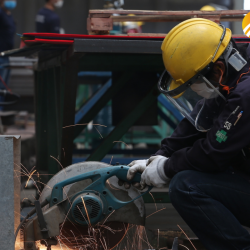Thailand enters 4th COVID-19 wave as more cases are of mutated virus, CCSA advisor says

Thailand is now entering the fourth wave of the COVID-19 pandemic, with the Delta coronavirus variant expected to become the dominant strain in Thailand and the rest of the world in 1-2 months, said Clinical Professor Emeritus Dr. Udom Kachintorn who is an advisor to the Centre for COVID-19 Situation Administration (CCSA) today (Tuesday).
In his Facebook live message, he said that the Delta variant is spreading fast in Thailand and, for June and July, is accounting for 30% of all new COVID-19 cases, particularly in and around Bangkok where it is around 50%, predicting that it will become the dominant variant in the next 1-2 months due to its fast transmissibility, which is 40% more than the Alpha strain, which represented 85-90% of all cases in Thailand prior to June.
He pointed out that the Delta variant hastens the lung infection, resulting the patients being put on ventilators in just 3-5 days, compared to 7-10 days in the case of Alpha variant. If this situation is allowed to persist, he said that the need for more hospital beds will increase steadily until the entire Thai health system collapses.
Regarding existing vaccines’ ability to deal with the Delta variant, Dr. Udom said that the study from Britain shows the efficacy of Pfizer, AstraZeneca and Sinovac has been reduced in dealing with the strain.
He said that Pfizer and Moderna are best at stimulating immunity, followed by AstraZeneca. When used against the Delta variant, efficacy of Pfizer drops from 93% to 88%, while the efficacy of AstraZeneca drops from 66% to 60% percent. For the prevention of severe symptoms, Pfizer has 96% efficacy, compared to 92% for AstraZeneca, he added.
As for the Chinese-made Sinovac, Dr. Udom admitted that there is very little information from the producer about the vaccine’s efficacy in protecting against the Delta variant adding, however, that he does not think the vaccine is good enough against it.
Whether a third dose is needed or not, he said studies are underway to try to determine which vaccine is suitable as a booster, with results expected in a month, but he did not recommend mixing vaccines for the first and second jabs.
He said that medical personnel should be the first group to receive the third jab, which should be AstraZeneca or an mRNA vaccine like Pfizer, because most of them were inoculated with Sinovac vaccine originally.
Studies from Oxford University, which is partnered with AstraZeneca in the development of the vaccine, show that, giving the third dose of AstraZeneca six months after the second dose will boost immunity six times and with few undesirable side effects.
Asked when the 4th wave of infections will end, he said Thailand has already imposed a partial lockdown in some provinces, but not maximum measures yet, adding that the CCSA will have to assess the situation in the next two weeks.
He said he would prefer to see new daily infections between 500-1,000 cases, as he urged everyone to cooperate in the fight against the new variant and to report for inoculation, to reach the 70% inoculated population target.






